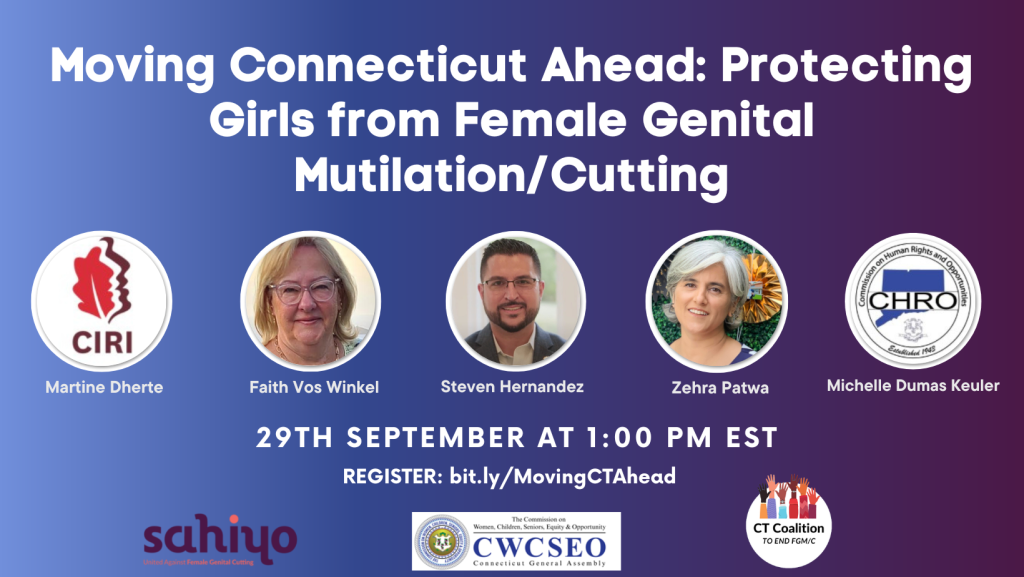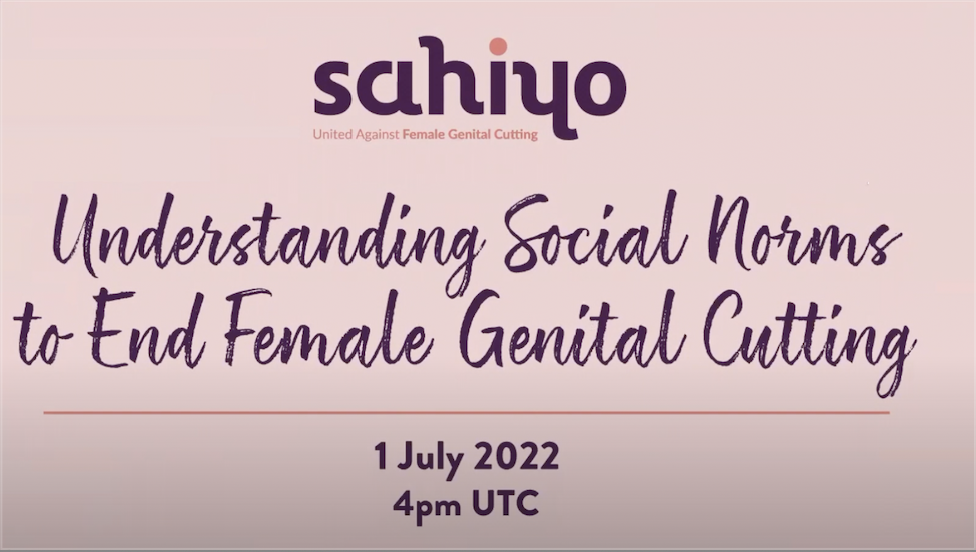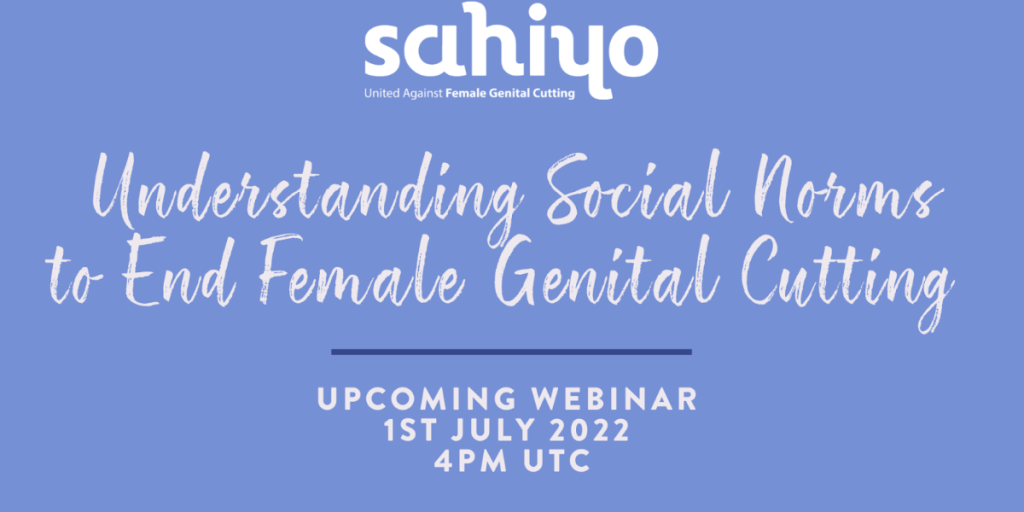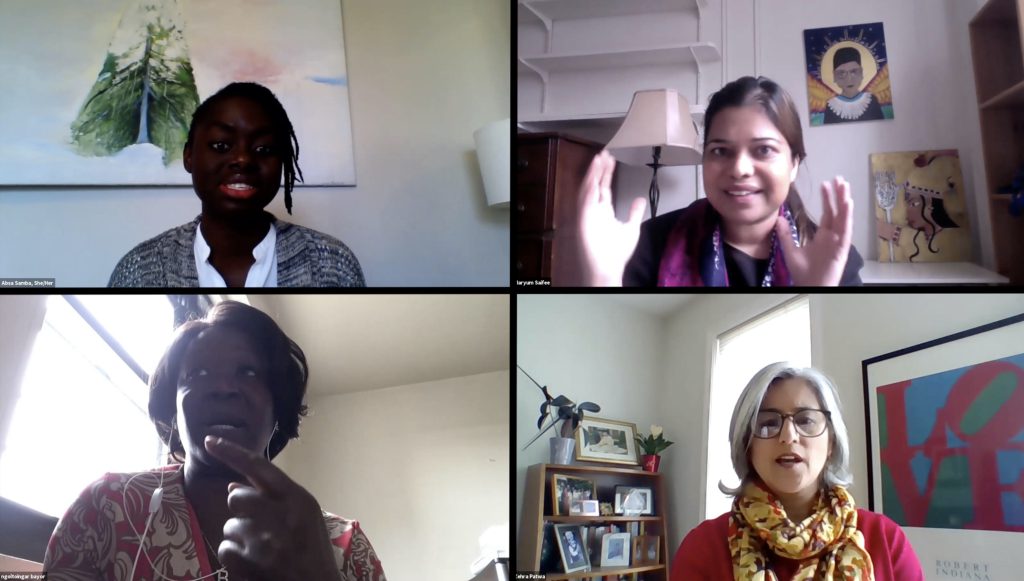Reflecting on ‘Moving Connecticut Ahead: Protecting Girls from FGM/C’, a webinar

By Meg Sinnott On September 29th, Sahiyo partnered with The CT Coalition to End FGM/C and The Commission on Women, Children, Seniors, and Equitable Access for All to host Moving Connecticut Ahead: Protecting Girls from FGM/C. This webinar was held to inform legislators, community members, and other stakeholders on the issue of female genital cutting (FGC) and how it impacts girls in the state. Connecticut (CT) remains one of the ten states in the U.S. with no legal protections against FGC. The webinar brought together key individuals living in the state of CT to discuss their reasons for supporting the passage of a law to end the social norm of FGC. Panelists included: Steven Hernandez – The Commission on Women, Children, Seniors, Equity & Opportunity Zehra Patwa – WeSpeakOut Michelle Dumas Keuler – Connecticut Commission on Human Rights and Opportunity Faith Vos Winkel – Connecticut Office of the Child Advocate Martine Dherte – Connecticut Institute for Refugees and Immigrants As a participant of the webinar, I thought that the panelists conveyed their message very effectively and eloquently: CT needs to adopt anti-FGC legislation now. As a former CT resident myself, I was shocked when I first found out that CT does not have a law already. A 2013 Population Reference Bureau study found that 2,658 women and girls in CT are at risk of undergoing or have already undergone FGC. For me, earlier feelings of shock have concretized into a need to take action, which includes helping to facilitate this webinar. I am very proud of the work that is being done by CT advocates, allies, and survivors to amplify awareness of FGC and its impacts, so that lasting change can be made. From conversations I have had with friends and family who live in CT, I’ve observed an assumption that somewhere like CT would not need legislation against FGC; this is due to the misconception that FGC only happens overseas, such as in countries within Africa and Asia. It was also surprising to hear that CT is so far behind other states in terms of protecting the rights of girls and other people using legislation since gender equity is a key priority for the state. In fact, US News & World Report recently lauded CT for its achievements on this issue, especially when it comes to equal access to economic opportunities. But even economic equity is limited when we don’t have the full participation of all of our women and girls. FGC reflects and perpetuates a broader trend of gender inequality. Zehra Patwa, a survivor of FGC and member of the Dawoodi Bohra community, spoke to the social norm piece of FGC through her discussion of how legislation could impact the prevalence of FGC in the Bohra community, which is one that abides by the law of the land and prioritizes the law before traditional practices. She demonstrated the universal truth that every society is influenced by norms that guide behavior and can help to solidify what conduct is acceptable or unacceptable within the group. Individuals may be socially sanctioned for not following social norms, which has been seen in instances of survivors and activists of FGC speaking out against the practice. Michelle Dumas Keuler explained how laws and policies that are shaped by our culture protect human rights, clarifying that CT needs anti-FGC laws (despite the existing federal law) to make prosecution more accessible, as well as to communicate to the wider community that CT is a state that values its girls and protects its citizens from harm. Faith Vos Winkel helped shed light on the impact that laws can have on a community. She expressed that every society has harmful social norms: not too long ago in the U.S. hitting children was considered acceptable. Domestic violence between a husband and a wife was legally permissible up until the 1970s, and it was considered a private matter. One takeaway I had from the webinar was that our knowledge of harmful norms has evolved, and so too has legislation in CT evolved in order to support ending these other harmful practices. The panel discussion made clear to me that in order to truly make an impact, we must support a holistic or multifaceted approach to address FGC, as we have for other harmful social norms like domestic violence, by writing advocacy and educational opportunities into the law. Watch the recording of this webinar here.
Reflection on Sahiyo webinar: Understanding Social Norms to end Female Genital Cutting

By Trisha Kini Sahiyo hosted the webinar Understanding Social Norms to End Female Genital Cutting on July 1st. The event was moderated by Sahiyo co-founder, and winner of the Chameli Devi Jain Award Aarefa Johari, and attended by distinguished guest speakers Molly Melching and Maryan Abdikadir. Maryan is a survivor and activist of female genital mutilation/cutting (FGM/C), who contributed to the Prohibition of FGM Bill in Kenya. She also participated in our 2022 Spring Voices to End FGM/C workshop. Molly Melching is the founder and creative director of Tostan, an NGO whose mission is to empower African communities by fostering and promoting community engagement in literacy, health, and human rights projects. Social norms are a growing set of unwritten rules and standards, which are passed on generationally in communities and cultures. These norms are often indisputably followed by society, as they are viewed as “the right thing to do” or dismissed with the notion of “this is how it is and should be.” FGC, although prohibited in many countries, continues to be practiced as a social norm wherein young girls, women, and those assigned female at birth (AFABs) are raised with the expectation that they must undergo the practice without having the autonomy to choose for themselves. Molly beautifully presented the three main factors to consider when classifying an action as a social norm: a reciprocal expectation within a reference group, which refers to the community of people the norms affect; positive and negative sanctions if the norm is followed versus not followed; and finally, value attached to the practice. The webinar began with Maryan’s moving and powerful Voices to End FGM/C video The Verbal Cut. Maryan shared her story of learning and unpacking FGC as a social norm and described learning that FGC has no basis in Islam and is not followed by all Muslim women. Amongst many other myths, she was told that if she does not undergo the procedure, her prayers will not be accepted in her faith. When she understood that FGC is not beneficial to women, and that these false beliefs were passed on to keep the practice in place, she decided against it for her daughter. Her daughter was shamed, ridiculed, and questioned for not undergoing FGC. Maryan’s video highlighted that even if some women decide to not follow the practice, this decision can still hurt them, which aligns with the norm that women’s value in practicing communities is determined by whether she is cut or not. FGC continues in so many communities due to the social norms that perpetuate it. As an outsider that does not belong to the community, Molly explained how informing people about the consequences of FGC in a non-judgemental, respectful manner can be very effective in facilitating conversations about abandoning the practice as a community. As part of Tostan’s human rights program, FGC survivors who have abandoned the practice approach leaders of practicing communities and facilitate conversation about the harmful health impacts of FGC. Following weeks to months of deliberation through community engagement, the community makes a final declaration. A considerate and respectful approach when talking about FGC may sound like using preferred terminology, such as “cutting’’ instead of “mutilation’’. Using vocabulary with harmful implications can be discouraging as words like “mutilation” can imply an intent to harm. However, Maryan, who belongs to the Somali community, prefers to use the term mutilation as she believes this term describes her experience with the practice. As outsiders, it is important to be aware of preferred terms when referring to FGC in order to accommodate and respect community and survivor experiences. As part of Molly’s activism, she continues to demystify myths associated with FGC, and terms considered taboo in order to facilitate effective conversations. Some countries, like the US, have named FGC as a punishable offense and a violation of the law, while some countries are yet to acknowledge FGC as punishable. Maryan and Molly agreed that the law helps as a fallback option, but also believe that it is barely a solution. However, Molly maintained that the law is often mentioned in conversation by survivors who abandoned the practice. This is helpful, as it provides a strong argument for both why the practice needs to be abandoned, and why there is a reason for laws against FGC. While it helps back up FGC as a harmful practice, education and community engagement are some of the most important approaches to ending FGC and dismantling it as a social norm. This webinar helped me understand how social norms can range from the simplest of societal expectations to life threatening consequences. Unwritten rules are ingrained so rigidly in society that it is difficult to notice them around us. This especially came to mind when Maryan mentioned she would have never thought to question FGC without finding out that her friend did not undergo the practice. It opened my eyes to silent norms present in communities around the world, which have the power to continue cycles of oppression in race and gender as we see today. It is important for us as a society to question harmful social norms and how we can shift them in a manner that uplifts voices around us to eventually break these cycles. Watch the webinar here. Read the webinar transcript here.
Notre Webinaire À Venir: Comprendre les normes sociales pour mettre fin aux mutilations génitales féminines

À propos du webinaire Même si les mutilations génitales féminines (MGF) sont condamnées par de nombreux traités et conventions à l’échelle internationnale, elles continuent d’être pratiquées conformément aux normes sociales. Les normes sociales ont une influence puissante sur les communautés et orientent les comportements, y compris les rôles, les attitudes et les valeurs de genre, qui contribuent au MGF. Le 1 juillet, notre webinaire explorera le MGF en tant que norme sociale. La discussion portera sur la tension communautaire entre les normes sociales et l’activisme du MGF. Ce webinaire réunira un large éventail de voix et donnera aux participants l’occasion de participer à la discussion sur la façon dont nous pouvons tous être mieux éduqués et de meilleurs défenseurs dans le cheminement pour mettre fin au MGF. Les normes sociales sont complexes, mais à mesure qu’elles évoluent, elles peuvent aussi mettre fin au MGF. Notre panel Cet événement sera modéré par la cofondatrice de Sahiyo, Aarefa Johari. Habitante de Mumbai, Aarefa est une activiste contre le MGF. Elle est également une journaliste talentueuse et lauréate du prix Chameli Devi Jain. Concernant nos principales intervenantes invitées, nous sommes ravis d’accueillir Maryan Abdikadir et Molly Melching. Maryan Abdikadir est une survivante et militante contre le MGF. Titulaire de deux maîtrises, Maryan est chercheuse et auteure. Elle a entrepris des programmes d’abandon des MGF et a participé à la rédaction du projet de loi sur l’interdiction des MGF au Kenya. Molly Melching est fondatrice et directrice de la création de l’ONG Tostan. Elle a reçu une reconnaissance internationale pour son travail novateur dans les domaines du changement des normes sociales et de l’éducation aux droits humains. Elle a reçu de nombreux prix, dont le Prix d’alphabétisation du Roi Sejong de l’UNESCO, le Prix Thomas J. Dodd pour la justice et les droits de l’homme, entre autres. Inscrivez-vous au webinaire Comprendre les normes sociales pour mettre fin aux mutilations génitales féminines ici.
Upcoming webinar: Understanding Social Norms to End Female Genital Cutting

About the Webinar Even though Female Genital Cutting (FGC) is condemned by many international treaties and conventions, it continues to be performed in accordance with social norms. Social norms have a powerful influence over communities and guide behaviour, including gender roles, attitudes, and values, which contribute to FGC. On July 1st, our webinar will explore how FGC is a social norm. The discussion will investigate tension between community social norms and the advocacy that occurs around ending FGC. This webinar will bring together a diverse array of voices and give participants the opportunity to be part of the discussion on how we can all become better educated, and better advocates, in the journey to end FGC. Social norms are complex, but as they evolve, so too can they bring about an end to female genital cutting. Our Panel This event will be moderated by Sahiyo co-founder, Aarefa Johari. Based in Mumbai, Aarefa is a Sahiyo co-founder and activist against FGC. She is also a talented journalist and winner of the Chameli Devi Jain Award. For our distinguished guest speakers, we are delighted to have Maryan Abdikadir and Molly Melching. Maryan Abdikadir is a survivor and activist against FGC. Holding two Master’s degrees, Maryan is a researcher and author. She has undertaken FGM abandonment programs and participated in the drafting of the Prohibition of FGM Bill in Kenya. Molly Melching is Founder and Creative Director of Tostan. She has received international recognition for her groundbreaking work in the areas of social norm change and human rights education. She has received numerous awards including: UNESCO’s King Sejong Literacy Prize, The Thomas J. Dodd Award for Justice and Human Rights, among others. Register for the Understanding Social Norms to End Female Genital Cutting webinar here.
Using Storytelling to Shift Social Norms and Prevent FGM/C: Event Reflection

By Cate Cox Sahiyo was honored to join StoryCenter to host the webinar, “Using Storytelling to Shift Social Norms and Prevent FGM/C,” during a parallel event for the 65th session of the United Nations Commission on the Status of Women on March 16th. Sahiyo and StoryCenter staff had the opportunity to introduce the collaborative Voices to End FGM/C project, which centers on storytelling by survivors and those affected by female genital mutilation/cutting (FGM/C) as a tool to challenge social norms that perpetuate the practice. From outlining the storytelling process to hearing from the participants themselves, the parallel event offered an in-depth exploration of the power that storytelling has to heal and create change on a global scale. Mariya Taher, a co-founder of Sahiyo and the U.S. Executive Director began by giving the audience an introduction to Sahiyo’s work and the Voices project. Next, the co-founder of StoryCenter’s Silence Speaks program, Amy Hill, explored the methodology behind the Voices project, and why storytelling in general can have such a big impact on individuals, communities, and policy. Former Voices participants Aarefa Johari, Severina Lemachokoti, Sunshine Bayor, Zehra Patwa, and Maryum Saifee shared their experiences with the project. Both organizations introduced three new storytellers: Absa Samba, Hunter Kessous, and Somaya Abdelrahman. After watching their amazing Voices videos which will be released in May, each participant had the chance to answer a few questions about their experiences and their plans for moving forward. Panelists emphasized the importance of survivor-centered advocacy, mental health, and trauma services for survivors, as well as encouraged the audience to become involved in advocacy. [youtube url=”https://youtu.be/cZL9agWVUfE”] Panelists also answered select audience questions about their work and experiences of creating their videos. Intimate and brave, the panelists opened up about their fears of backlash and the ways that their videos still impact them. Both organzations shared resources with the audience to further educate themselves about the work Sahiyo and Storycenter are doing and to learn more about the Voices to End FGM/C project. “Using Storytelling to Shift Social Norms and Prevent FGM/C” was an ode to the power storytelling has to empower communities to abandon FGC and support survivors’ healing. It also highlighted the amazing work everyone at Sahiyo and StoryCenter are doing in their own capacity to advocate for women’s rights and shined a light on the often-overlooked work being done by grassroots organizations across the world. Watch the recording of this event. To learn more about Sahiyo’s work, Sahiyo staff will be hosting a webinar in partnership with The US End FGM/C Network and the Asian Pacific Institute on Gender-Based Violence on April 15th, at 2:30 pm EST over Zoom.
